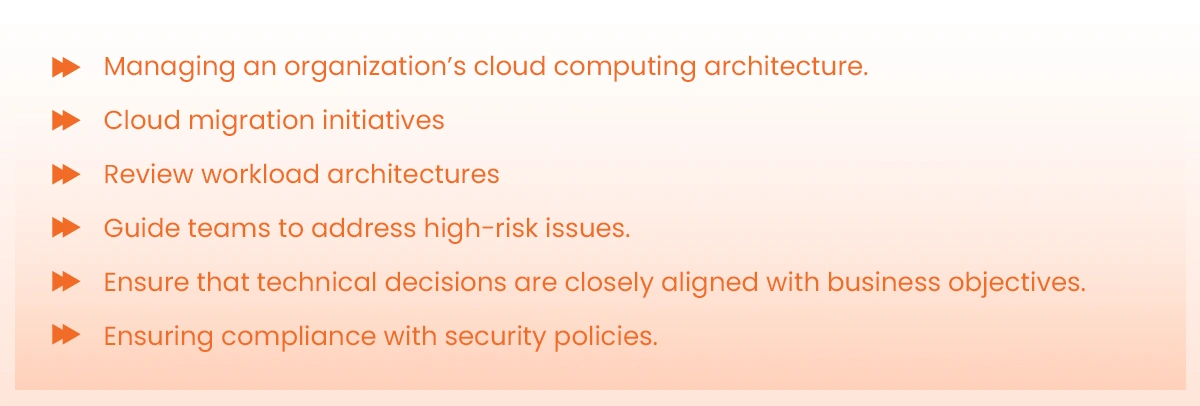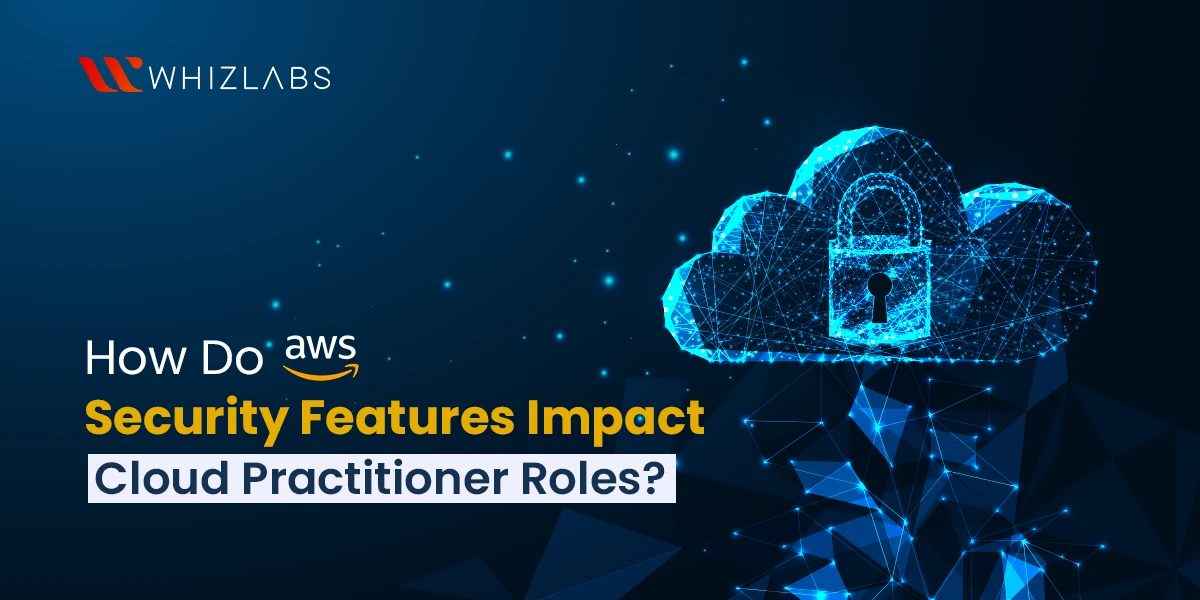In this blog, you will look into the significance of AWS security features and how this knowledge empowers AWS Certified Cloud Practitioners to fulfill their responsibilities in today’s digital landscape. Read through for an overview of AWS security features, best practices, cloud security management, and future trends.
What Are the Core Competencies Expected From AWS Cloud Practitioners?

How Do AWS Tools Simplify Security Management for Practitioners?
The AWS Cloud Practitioner’s role becomes more relevant as cloud computing gains traction. An important prerequisite for performance in this position is understanding how AWS security measures influence their responsibilities. While the significance of AWS Security features is soaring, the human factor of the process is the silver lining of the cloud.
Selecting the best tool for your needs can be challenging because so many options are available to help you secure your AWS environment. Consider various factors, and pick what suits you best!
IAM and its significance to cloud security
- IAM secures AWS since it controls access to your AWS services and resources.
- IAM is needed to set up secure access rights and fast identity management.
- Businesses need to consider IAM as a component of their overall security posture and incorporate an integrated security layer throughout the lifecycle of their applications.
- To quickly identify and address any possible security threats, log and monitor IAM activity. Examine access logs frequently to look for unusual activity.
GuardDuty and SecurityHub key AWS security services
You can secure your AWS environment with both Security Hub and GuardDuty, but there are some significant distinctions between the two services.
- AWS GuardDuty is a managed threat detection service that keeps an eye on your AWS accounts and workloads for unauthorized activity and malicious activity.
- AWS SecurityHub gives you a thorough overview of your security posture across all of your AWS services and accounts.
AWS Secrets Manager, Macie, and CloudTrail
AWS Secrets Manager is an AWS service used for securely storing and retrieving sensitive confidential data such as API access keys and database connection details, among others. Other means by which you can interact with Secrets Manager include the AWS Management Console, AWS Command Line Interface, or AWS Cloud Development Kit for applications.
For detecting and preserving compliance with data stored in Amazon S3 buckets, Amazon Macie is a security and data privacy program. To ensure that your organization complies with the regulatory requirements and prevents data leakage, Macie automatically analyzes and tags data using machine learning techniques.
Turn on AWS CloudTrail to log and track API calls and activities across your AWS account. CloudTrail makes auditing, security analysis, and compliance easier with user activity insights.
AWS Shield and KMS
In the realm of AWS CCP, two pivotal services, AWS Shield and AWS KMS, work together to bolster the security posture of cloud-based applications.
Shield and KMS are two AWS security tools for practitioners that make up a formidable security wall. The vulnerabilities aim to protect confidential information within the AWS domain and shield secure information from external threats.
Role of security in cloud certification
Companies keep private data, including sales records, intellectual property, and customer financial information, which could be destroyed if it were to leak. Using strict cloud security measures is therefore crucial.
Cloud professionals need to be aware of the shared responsibility model, which holds that the customer is in charge of the security “in” the cloud (data and apps) and AWS is in charge of the security “of” the cloud (infrastructure).
Shared Responsibility Model: Application
Customers and AWS share accountability for security and compliance; customers are in charge of the guest operating system and application software, while AWS is in charge of the infrastructure. The shared model offers flexibility and control while relieving the customer of their operational burden. Establish the goals and requirements for internal and external security as well as the associated compliance.
Examine each AWS service’s configuration options and security features. Assess AWS Security, Identity, and Compliance services to learn how to use them to achieve security and compliance goals.
What is the Impact of Cloud Security Features on Cloud Practitioner Roles in AWS?
Cloud practitioners are responsible for making sure that their cloud environments meet security and legal requirements. Additionally, they have to keep an eye on security events and react to them quickly and efficiently. You need to make sure that their cloud environments adhere to industry standards and AWS security best practices.
Necessitates for a Strong Grasp of AWS Cloud Security Features
Best Practices for AWS Security
- Apply the least privilege principle. Minimize access to resources given that users can perform their tasks. AWS employs identities to manage who can access which AWS resources.
- Regularly switch up your credentials. They range from passwords, API keys, and any form of access token.
- Use encryption and secure passcodes. Adhere to the standard encryption levels and password complexity observable across the production industries.
- Keep an eye out for any unusual activity on your AWS account. In addition, perform a risk assessment by inspecting security reports and activity logs for potential risks regularly.
- It is important to update your software more often. To eliminate risk exposure, update your operating systems and applications with patches.
- Regularly check your security posture. The best way to know if your security posture is correct is to check it frequently. Success factors: Vulnerability assessment and penetration testing.
- Prepare a strategy for handling security-related incidents. Know how to come up with an incident response plan where the organization clearly outlines what should be done in case of a security breach.
- It is therefore important to update yourself on security flaws and threats. To learn about the latest threats, then continue reading news related to the industry and subscribe to security alerts.
- Make users aware of security measures; continuously update knowledge in AWS security measures.
- Engage with security and compliance and ensure that the security procedures comply with company policies.
Why and How to Achieve an AWS Certification for Cloud Security Careers?
Collaboration and communication within cross-teams and between cloud practitioners and security teams are crucial parts, and the AWS Certified Cloud Practitioner certification provides a solid foundation for those new to the cloud. And becoming one can fuel your growth in cloud security. It’s relatively easy unless you are new to IT concepts. Even so, you should be fine if your memory retention skills are quite good.
With more than nine hours of video and four full-length mock exams, including more than 300 practice questions on the AWS Certified Cloud Practitioner Course and more than fifty hands-on labs, Whizlabs offers the best-in-class video course and sandbox that will help you pass the AWS Certified Cloud Practitioner exam (CLF-C02) on your first try. Prepare a custom schedule according to your expertise and acing the test would be our recommendation.
Future Trends and Opportunities in Cloud Security Careers
The growing importance of cloud computing with the rise of AI and machine learning will open doors to new opportunities. Increased investment in cloud computing and the multi-cloud adoption of cloud will require multiple cloud-certified professionals who can design, implement, and manage secure cloud environments.
The following industries are using cloud computing the most and require security expertise:
To put it briefly, because of the ever-changing threats and the challenge of locating skilled personnel, cloud security specialists are now in high demand across almost all industry verticals.
The security features offered by AWS will remain essential for maintaining governance and compliance in cloud environments. Maintaining a competitive edge in the job market requires Cloud Practitioners to stay current on the newest AWS security features and best practices.
Final thoughts
This blog sheds light on the significance of security in cloud environments and the future of cloud practices, the role of a AWS Certified Cloud Practitioner in maintaining the security wall, and the vital presence of a responsibility that comes with being cloud certified. Get AWS certified and improve your organization’s security measures.




